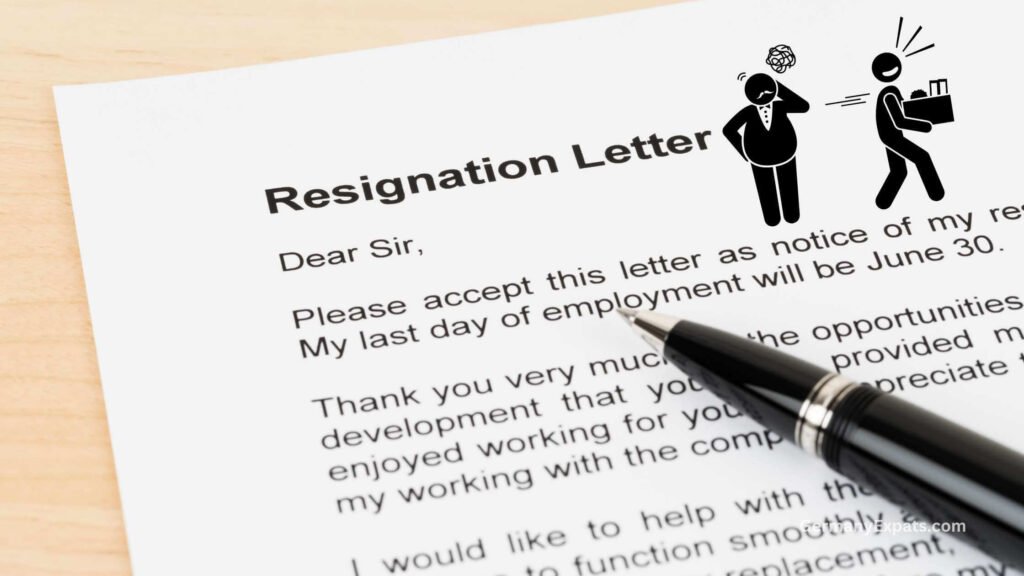Resignation Letter Germany: Are you thinking about resigning from your job in Germany? You will need a Resignation Letter. In this article, we will guide you on how to write a professional resignation letter, understand legal notice periods, and avoid common mistakes. Get expert tips, templates, and legal insights to ensure a smooth exit. Read the complete guide now!
Resignation Letter Germany
So, let’s start discussing about it. Resigning from a job in Germany requires a formal approach. A well-written resignation letter ensures a smooth transition and maintains professionalism. Employment laws in Germany regulate resignation, requiring employees to follow specific legal procedures and notice periods.
When you resign, you must follow German labour laws requiring a written letter. Simply informing your employer verbally or via email may not be legally valid. Your resignation letter also helps maintain professionalism and ensures you leave on good terms, which can benefit your future career.
Understanding the Resignation Process in Germany
Due to strict labour laws, resigning from a job in Germany requires careful planning. Employees must follow legal procedures to ensure a smooth exit while maintaining a good professional reputation.
Legal Framework Governing Resignations
In Germany, resignations are regulated by Section 622 of the German Civil Code (Bürgerliches Gesetzbuch, BGB). Employees can resign anytime but must provide written notice (Kündigungsschreiben). Resignations sent via email, fax, or verbally are not legally valid. The letter must be signed and submitted in physical form.
Employers in Germany face restrictions on terminating employees, depending on employment contracts and collective agreements. Some industries offer additional protections, ensuring job security and preventing unjust dismissals.
Importance of Adhering to Notice Periods
German law requires employees to serve a notice period (Kündigungsfrist) before leaving. The standard notice period is four weeks to the 15th or end of the month unless the contract specifies a longer period. In many cases, contracts extend this based on tenure:
- Less than 2 years: 4 weeks
- 2–5 years: 1 month
- 5–8 years: 2 months
- 8–10 years: 3 months
- 10+ years: Up to 7 months
Failing to honour the notice period can lead to legal consequences, such as compensation claims from the employer. Employees who want to leave earlier may negotiate a termination agreement (Aufhebungsvertrag) to shorten the notice period by mutual consent.
Resignation Letter Template for Germany
Here, we prepare two versions of the resignation letter, one in English and one in German. Feel free to use them and let us know in the comments how these templates help you.
📌 Explanation of Each Section
- 1. Header (Personal & Employer Information)
- Includes your name, address, and contact details.
- Lists the employer’s name, company name, and address.
- Date
- The date must match when the letter is handed over.
- Subject Line
- Clearly states the purpose: resignation from your job.
- Opening Statement
- Clearly state your resignation, job title, and last working day based on the notice period.
- Expression of Gratitude (Optional but recommended)
- Shows appreciation for the experience and work environment.
- Request for an Arbeitszeugnis (Highly recommended in Germany)
- Employmust legallyd to provide a reference letter (Arbeitszeugnis) upon request.
- It can be simple (confirming employment) or detailed (evaluating performance).
- Closing Statement
- Reassures the employer of a smooth transition.
- Signature
- A handwritten signature is mandatory for validity.
Customizing Your Resignation Letter
A resignation letter should not be a generic template. While the structure remains formal, personalizing it makes it more professional and leaves a positive impression. Employers appreciate a thoughtful resignation letter that reflects the employee’s specific situation.
📌 Examples of How to Tailor the Resignation Letter
1. Standard Resignation (Neutral Tone)
Use a simple, professional tone if you are resigning under normal circumstances.
Example:
“I have decided to resign from my position as [Job Title] at [Company Name], effective [Last Working Day], following my contractual notice period. I sincerely appreciate the experience and opportunities provided during my time here.”
2. Resignation for a New Job Opportunity
If you are leaving for a better opportunity, you can express gratitude while staying professional.
Example:
“I am grateful for the experiences and professional growth I have gained at [Company Name]. However, I have decided to pursue a new career opportunity. My last working day will be [Last Working Day]. I will ensure a smooth transition before my departure.”
3. Resignation Due to Personal Reasons
Keep it brief if you are leaving for health issues, family obligations, or relocation.
Example:
“Due to personal reasons, I must step down from my role at [Company Name] as of [Last Working Day]. I appreciate the support and guidance from my colleagues and management.”
4. Resignation Due to Workplace Issues
If resigning due to conflicts, avoid negative language but stay firm.
Example:
“After careful consideration, I have decided to resign from my position at [Company Name], effective [Last Working Day]. While this decision was difficult, I believe it is the best step for my professional growth. I appreciate the opportunities I have had here.”
5. Resignation with a Request for Early Release
Request formally if you want to leave before the standard notice period.
Example:
“I hereby submit my resignation, effective [Last Working Day]. I would appreciate the opportunity to shorten my notice period if possible. Please let me know if this can be arranged.”

Submitting Your Resignation Letter
Resigning from a job in Germany requires more than just writing a formal letter. How you submit it can impact your professional reputation and future references. Following the correct procedure ensures a smooth transition and avoids legal issues.
Best Practices for Delivering Your Resignation Letter
✅ Submit a Physical, Signed Copy: In Germany, resignations are only valid if submitted in written form with a handwritten signature. Emails, scanned copies, or verbal notices are not legally accepted.
✅ Hand It Over in Person: Whenever possible, personally deliver the resignation letter to your direct manager or HR. This shows professionalism and respect. If an in-person submission is not possible, sending it by registered mail (Einschreiben mit Rückschein) ensures proof of delivery.
✅ Keep a Copy for Your Records: Always keep a signed copy of your resignation letter and ask for a confirmation receipt from HR or management. This serves as proof in case of any disputes.
✅ Submit It Within the Notice Period: Ensure that your resignation follows the contractual or legal notice period. Late submission may cause unnecessary delays or legal issues.
✅ Follow Up for Confirmation: After submitting your letter, request written confirmation from HR to avoid misunderstandings about your last working day.
After Submitting Your Resignation
Once you’ve handed in your resignation letter, your employer will process it and prepare for your departure. Your behaviour during the notice period impacts your professional reputation, future references, and colleague relationships.
What to Expect After Handing in Your Resignation Letter
Confirmation of Resignation: Your employer should acknowledge your resignation in writing. If you don’t receive confirmation, follow up with HR to ensure no misunderstanding.
Your manager may cover several important topics during your discussion, including:
- Your final working day will be determined according to your notice period.
- The process for handing over your responsibilities to a colleague or replacement.
- You must complete any outstanding work that must be addressed before your departure.
Exit Interview (Optional): Many companies conduct an exit interview to understand why employees leave. You can provide constructive feedback but avoid overly negative comments.
Final Paycheck & Benefits Settlement: You should receive your last salary, including any pending bonuses, unused vacation days, or reimbursements. Confirm this with HR before your last day.
Issuance of an Arbeitszeugnis (Work Reference Letter): In Germany, employees are entitled to a work reference letter (Arbeitszeugnis). Ensure you request your resignation letter.
Return of Company Property: You must return company assets like laptops, access cards, or work phones. HR will typically provide a checklist for this process.
Conclusion
A well-crafted resignation letter is essential for leaving a professional job in Germany. It ensures legal compliance, maintains a positive relationship with your employer, and secures a good reference for future opportunities.
You demonstrate respect and responsibility by following the correct resignation process—writing a formal letter, adhering to the notice period, and handling your departure professionally. A smooth transition benefits you and your employer and keeps your career reputation intact.
Approach your resignation with thoughtfulness and professionalism. Even if you are leaving for better opportunities, resigning gracefully can open the door for future collaborations. Stay professional, fulfil your duties until the last day, and express gratitude for the experience. A strong exit is just as important as a strong start.
Essential Resources for Resigning in Germany
1. German Civil Code (BGB § 622 – Notice Periods):
📌 https://www.gesetze-im-internet.de/bgb/__622.html (Official source for legal notice periods.)
2. Federal Employment Agency – Unemployment Benefits After Resignation
📌 https://www.arbeitsagentur.de/arbeitslos-arbeit-finden/arbeitslosengeld (Useful for employees planning their transition after resignation.)
3. IHK Guide on Arbeitszeugnis (Work Reference Letter)
📌 https://www.ihk.de/themen/arbeitsrecht/arbeitszeugnis (Explains why employees should request a reference letter when resigning.)

